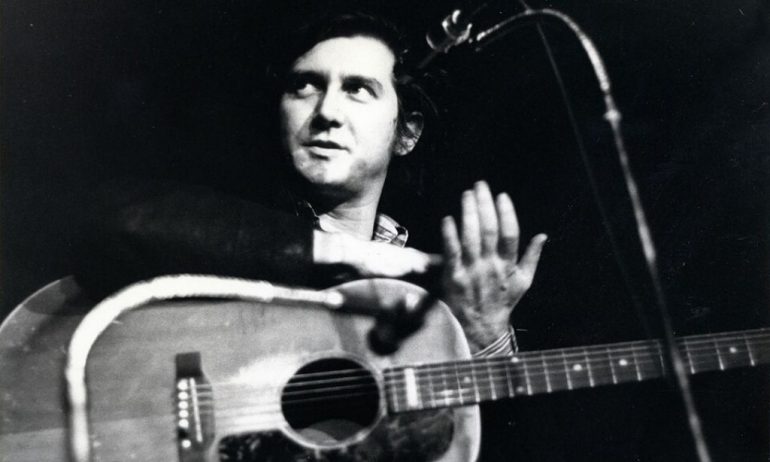In many ways, Phil Ochs was a man ahead of his time. He is inextricably linked to the counter-culture and anti-authoritarianism which was so prominent throughout the 1960s when he was at his creative peak. But he brought an inimitable, piercing wit to his songwriting which has scarcely been bettered since.
As a youngster, he rose to the role of principal soloist at the Capital University Conservatory of Music in Ohio before reaching the age of sixteen. But his real passion lay outside the classical genre. He had a fascination with iconic figures like Buddy Holly and Elvis Presley, as well as with country stars like Johnny Cash. But at this point in his life, there was no apparent indication that he might take an interest in folk music professionally.
Embed from Getty ImagesHis movie heroes were Marlon Brando and James Dean, the ultimate cinematic “bad boys” of the 1950s. In 1958 Phil enrolled to study at the University of Ohio but became quickly disillusioned with his studies. He took a leave of absence and traveled to Florida, where he got a grim dose of reality that would influence the course of his life.
Phil was jailed for two weeks after he was caught sleeping on a park bench. When he emerged from his brief stint behind bars he was a changed man. He took an interest in writing and, above all, social activism.
Phil Ochs – Social Activism
Phil Ochs became highly active in the left-wing political scene and returned to the University of Ohio to study journalism. This was at the height of the communist revolution in Cuba in 1959. A time when the political left was seen as a threat to democracy. So Phil’s interest no doubt stemmed from his fascination with counter-culture and rebellion that he had gained from watching his movie idols during his formative years.
At college, he met Jim Glover, who was to prove a key figure on his development. Jim was a fellow student who was highly involved with folk music. He introduced Phil to socially-conscious rebels like Woody Guthrie and Pete Seeger. He also, crucially, taught Phil how to play guitar.
Embed from Getty ImagesPhil’s pursuit of radical left-wing politics led him to start his own underground newspaper, The Word. But he soon saw the potential for combining his two great loves: music and activism. He began writing protest songs, which he and Glover performed as a duet, “The Singing Socialists.”
The partnership was not to last, however, and they split before their first professional performance. Glover headed to New York, and the spiritual home of folk in Greenwich Village, to pursue a career in music. Phil remained in Ohio to study, but he performed solo at a few key folk clubs in the region. He even opened up for a few established artists of the time, like the Smothers Brothers.
A Protest Singer In Greenwich Village
But his studies never came to anything in the end. Bitter about being overlooked for the role of editor in chief of the college paper, Phil Ochs dropped out before graduation. Like his pal Glover, he headed to New York City, with his sights set on a career in professional music.
He soon made a name for himself on the Greenwich Village scene, where his fiery and passionate protest songs set him apart from the crowd. His musical critiques of contemporary culture, incorporating anti-war and pro-civil rights protests were powerful in their simplicity, and he made numerous appearances at political events and public protests.
In 1963, the acclaim he had achieved in the underground music scene culminated in an appearance at the Newport Folk Festival alongside such legendary figures as Joan Baez and Bob Dylan. In ’64 he recorded his first studio album, All the News That’s Fit to Sing.
Embed from Getty ImagesThe title alone gives you an idea of the polemical nature of the songwriting. “Talkin’ Vietnam” and “Talkin’ Cuban Crisis” speak for themselves, while “Too Many Martyrs” paid tribute to murdered civil rights figures Medgar Evers and Emmett Till.
He recorded two more albums, I Ain’t Marching Anymore and Phil Ochs in Concert, in 1965 and ’66 respectively. These were also critically lauded and continued to build up Phil’s following on the folk music scene. During this time he also cultivated a friendly rivalry with Bob Dylan, and his songwriting prolificacy certainly matched Dylan’s: Phil practically churned out new material at a startling rate.
Life In California
But just as he was beginning to settle into the rut of performing and recording, Phil made a drastic change in his life. He ditched Elektra, his previous record label, and switched to A&M, relocating to LA in the process. This, however, was not the deft career move it might have at first appeared.
Phil Ochs was tempted to experiment with his tried and trusted folk sound. He produced a number of albums in the late ’60s which deviated significantly from his winning formula and yielded little success. Albums like Pleasures of the Harbor and Tape From California display increased pop sensibilities as well as multi-instrumentation; this was Phil’s concerted attempt to reach mainstream popularity. Unfortunately, it wasn’t to be.
Reviews of his new direction were mixed, though, in fact, he had lost none of the fierce political nature of his lyrics. New songs like “The War Is Over” and “Outside of a Small Circle of Friends” were just as righteously angry as anything he had written in his early days.
But the late ’60s brought with it increased political turmoil. The Vietnam war continued apace, and 1968 saw the assassination of two key figures: Martin Luther King and Robert F. Kennedy. Phil had a hand in the inception of the so-called “Youth International Party,” a left-wing and anti-war political organization.
He also helped to plan a “Festival of Life” event to take place at the 1968 Democratic National Convention in Chicago. This large-scale protest was met with riots and violent suppression by the Chicago police.
The Sad Decline Of Protest Singer Phil Ochs
Frustration and disillusionment sent Phil Ochs spiraling into depression as the ’60s ended. With the onset of a new decade, he decided he needed a drastic change. As his folk and counter-cultural efforts were yielding little success, he decided that he needed to adopt a more mainstream image, to spread his message to the masses.
To go about this, he headed back to his musical roots: Elvis and Buddy Holly. His 1970 album, the ironically titled Greatest Hits (it was all-new material, with no previously released songs) showcased a more rock and country-based sound. This divided his fans, and his new look with a flamboyant gold suit was met with boos when he took to the stage in support of the album.
Embed from Getty ImagesHis depression worsened, and his dependence on pills and alcohol to get him through performances only increased. Likewise, his political activism became more and more dangerous. During travels in South America in 1971, his association with communist dissidents led to his arrest in Uruguay.
But back in the US, his place alongside the counter-cultural elite remained unchallenged. Alongside such luminaries as John Lennon, Allen Ginsberg of the Beat Generation, and Stevie Wonder, he made an appearance at a large-scale benefit event in the winter of ’71.
But he seemed to have lost his affinity for songwriting. His writer’s block proved so severe that in 1972 he made yet another drastic change in his life. He headed out on the road, traveling the world in search of inspiration.
Africa was one of his destinations, and whilst in Tanzania, he was attacked and robbed. During this incident, one of his attackers gripped him by the throat and did irreparable damage to his vocal cords. He was however still able to perform, albeit with a reduced vocal range. But the incident took its toll on his mental health.
Phil Ochs had already been struggling with depression and bipolar disorder, but the attack plunged him into paranoia. He was convinced that enemies (such as the CIA) were out to get him. This paranoia would linger for the rest of his life.
During this period his brother, Michael Ochs, attempted to get him admitted to a psychiatric hospital, but it was unsuccessful, despite the pleading of Phil’s close friends and family.
The 1973 overthrow of Chilean President Salvador Allende in a violent coup d’état saw the public torture and murder of Phil’s friend, the folk musician Victor Jara. This galvanized Phil to take action, and he quickly assembled a fundraiser for Chile. A last-minute appearance by Bob Dylan turned the event into a roaring success.
But Phil’s last musical hurrah came with a large rally he organized in New York’s Central Park in 1975, to celebrate the end of the Vietnam war. Over 100,000 people attended, and performers alongside Phil included Harry Belafonte and Joan Baez.
The Tragic Death Of Protest Singer Phil Ochs
However Phil’s mental health continued its rapid decline, and in the spring of 1976, he was officially diagnosed with bipolar disorder. He moved in with his sister Sonny, where he committed suicide in April of 1976. He was 35 years old.
All in all, Phil Och’s life was short and tragic. But his music stands today as a lesson in the importance of standing up to authority and challenging the status quo. For that, he will never be forgotten.
To hear “When I’m Gone”, one of our favorite songs from Phil Ochs, check out the video below from SirSomebody.
Frequently Asked Questions
Who Was Phil Ochs?
Protest Singer Phil Ochs was an American singer/songwriter, known for his topical songs, often about political activism.
How Old Was Phil Ochs When He Died?
Phil Ochs was 35 when he passed away.
How Did Phil Ochs Die?
Tragically, Phil Ochs took his own life in 1976.
What Was Phil Ochs’ Most Famous Song?
Possibly his most famous song was “I Ain’t Marching Anymore”. The song is considered a protest song about America’s involvement in the Vietnam War.
Who Was Michael Ochs?
Michael Ochs was the brother of protest singer Phil Ochs. A renowned photographer he also managed his brothers’ music career.
Selected Songs Of Protest Singer Phil Ochs
| Year | Title | Album |
| 1966 | “I Ain’t Marching Anymore” | I Ain’t Marching Anymore |
| 1967 | “Cross My Heart” | Pleasures Of The Harbour |
| 1968 | “The War Is Over” | Tape From California |
| 1969 | “My Life” | Rehearsals For Retirement |
| 1973 | “Kansas City Bomber” | Non-Album Single |
| 1974 | “Power And The Glory” | Non-Album Single |
Similar Stories…
- Townes Van Zandt – The Ramblin’ Life of Texas Folk Legend
- Joan Baez Songs – 10 Essential Tracks You Need to Know
- James Taylor Songs – 10 Essential Tracks You Need to Know
- The Alice Cooper Fact Sheet – 5 Things You Need To Know - January 12, 2023
- Everybody Knows The Words, But What Is Hotel California About? - April 29, 2022
- What Is The Meaning Of Stairway To Heaven: Led Zeppelin’s Amazing 1971 Musical Epic? - April 24, 2022


